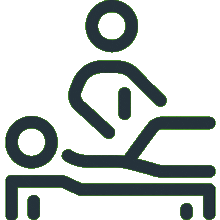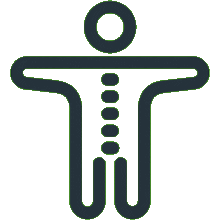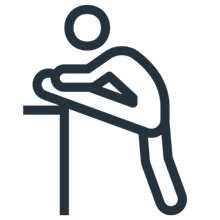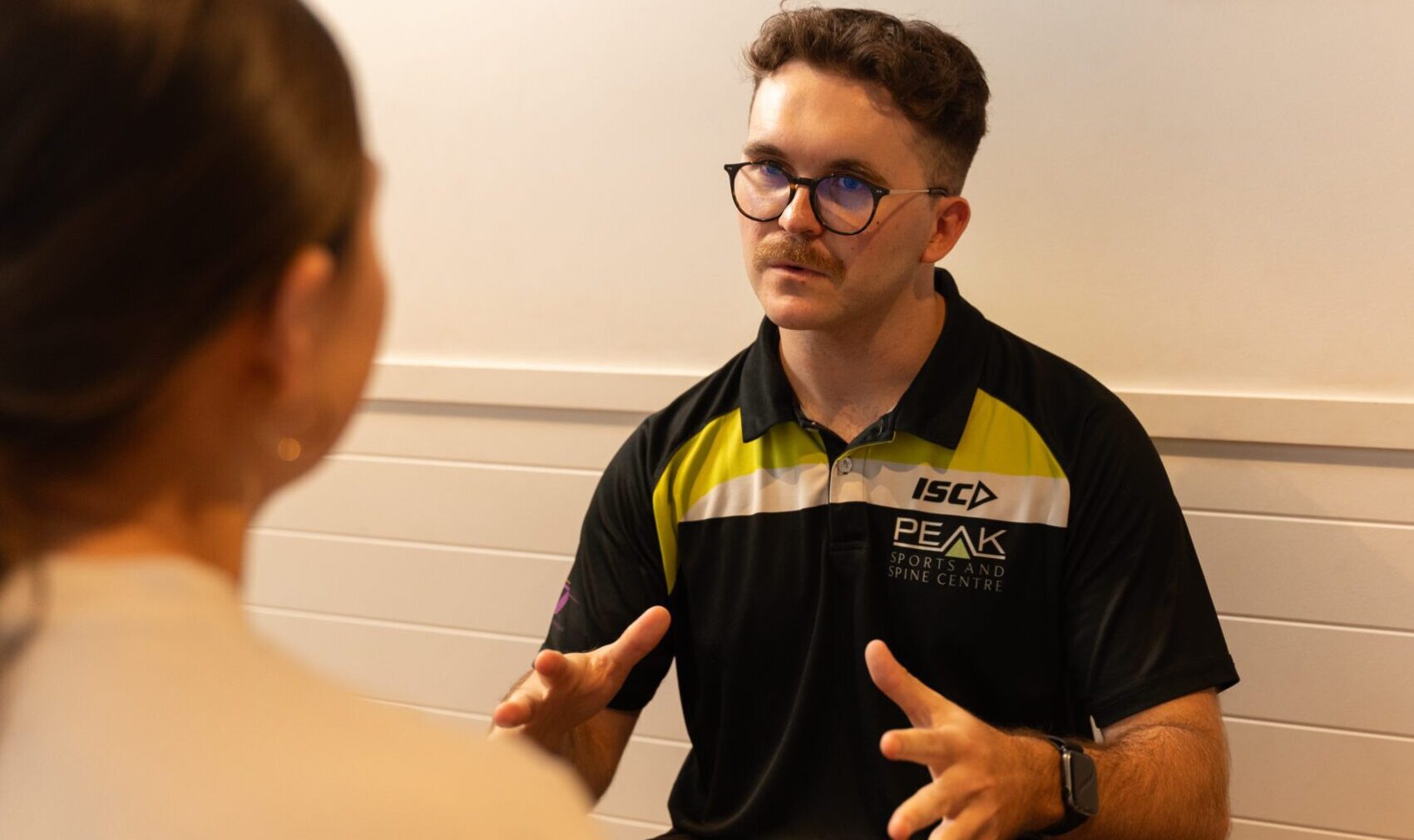Signs and Symptoms of Meniere’s Disease
Meniere’s is known for a characteristic set of symptoms, especially during acute “attacks” or episodes:
- Vertigo attacks: Sudden, spinning vertigo that can last anywhere from 20 minutes to several hours. During these attacks, you may feel like you or the room is whirling violently. Vertigo is often accompanied by imbalance – you might not even be able to stand or walk without support during a bad episode.
- Hearing loss: Typically unilateral (in one ear) and fluctuating. In early stages, hearing returns to normal between attacks, but over time there may be a progressive loss, especially in low frequencies. Voices might sound muffled, and you could have difficulty hearing in that ear during an episode.
- Tinnitus: A ringing, buzzing, or roaring sound in the affected ear. Some people say it sounds like holding a seashell to the ear or a constant whine. Tinnitus can flare up or become louder before or during an attack.
- Ear fullness or pressure: A sensation of the ear being “full” or plugged, akin to the feeling when on a plane that won’t pop. This pressure often precedes an attack, acting as a warning sign for some individuals.
- Nausea and vomiting: The severe vertigo often leads to gastrointestinal upset. It’s common to feel nauseous or vomit during acute episodes.
- Drop attacks (Tumarkin’s otolithic crises): In some cases, Meniere’s can cause sudden falls without warning (you feel like you’re suddenly pushed to the ground). These are caused by a sudden change in the inner ear signals. They are alarming but typically brief.
- Aftermath symptoms: Following an attack, you may feel very fatigued, shaky, and unstable on your feet for hours or days. Some describe a “hangover” effect where their balance is not quite right and they feel drained.
These symptoms can vary – you might experience several attacks in a short period (clustered) and then have months of remission, or you might have a chronic smoldering form with milder but more frequent dizziness and hearing issues. It’s a very individual condition.
Impact on Your Life
Meniere’s disease can significantly impact daily living and emotional well-being:
- Unpredictability and Planning Life: One of the hardest parts is never knowing when an attack will strike. This unpredictability can make it hard to plan outings or commit to events. You might avoid long drives, swimming, climbing ladders, or being alone in situations where a sudden attack could be dangerous or embarrassing. Many patients carry emergency medication (like vestibular suppressants) and have an exit strategy wherever they go, just in case – which is mentally exhausting.
- Work and Productivity: If you have frequent attacks, it can lead to missed days at work. Even on “okay” days, the residual unsteadiness or tinnitus can reduce your concentration. Certain jobs become challenging – for example, operating heavy machinery, working at heights, or jobs requiring acute hearing (like musicians or sound engineers). Career adjustments or even changes might be necessary, which can be financially and emotionally tough.
- Driving limitations: During a vertigo attack, driving is impossible, and it can be unsafe even during mild dizziness. Many with Meniere’s voluntarily restrict driving or stop altogether until they have the condition well-controlled, relying on public transport or others. Losing the freedom to drive can affect independence for errands, social visits, and work.
- Social Isolation: Friends and family might not fully grasp what you’re going through, especially if attacks are sporadic. You might cancel on plans last-minute, or choose to stay home to avoid triggering an episode (for instance, some avoid loud concerts or certain foods like salt/alcohol that they’ve been told could worsen Meniere’s). This can lead to feeling isolated or left out.
- Emotional Health: Living with Meniere’s can be like living on a rollercoaster. Anxiety is common – both general anxiety and specifically “anticipatory anxiety” worrying about the next attack. Depression can also occur, as the chronic nature and hearing loss may make you feel like life is fundamentally altered. There’s also a grief element in possibly losing some hearing or the ease of mobility you once had.
- Physical Safety and Fitness: If your balance is affected between episodes, you may be at higher risk of falls or accidents. This might make you more cautious and less active. Over time, reduced activity leads to weaker muscles and poorer fitness, which ironically can worsen balance further. Fear of having an attack during exercise might also keep you away from physical activity, creating a cycle of decline.
All these factors underscore why a proactive management plan is so important. With the right strategies and support, many people with Meniere’s lead fulfilling lives, with attacks reduced in frequency/severity and confidence regained in daily activities.
How Peak Sports and Spine Centre Can Help Manage Meniere’s Disease
Managing Meniere’s typically involves a combination of medical treatment (from an ENT specialist) and supportive therapies. At Peak Sports and Spine Centre, our focus is on keeping you steady, strong, and prepared – essentially optimizing your balance system and overall function so that you can better weather Meniere’s episodes and maintain an active life. Here’s how our team and physiotherapy for Meniere’s disease can assist:
- Vestibular Rehabilitation Therapy (VRT): Meniere’s is tricky because the vestibular (balance) input from your affected ear fluctuates (normal at times, reduced at others, and chaotic during attacks). Over time, repeated attacks can lead to a more permanent vestibular loss on that side. Our physiotherapists will tailor a vestibular rehab program to your needs. If you’re in a relatively stable phase, we work on general vestibular adaptation exercises – training your brain to rely on the healthier ear and other senses to maintain balance. If you’re in an active phase with frequent attacks, initially we focus on safety and gentle exercises to keep you moving without provoking vertigo. In later stages, if the ear’s function declines, we shift to compensation strategies similar to treating vestibular hypofunction (as described in our vestibular hypofunction section above). Essentially, we help your body adjust to any changes in balance function more quickly, so you’re less debilitated by them.
- Balance and Fall Prevention Training: Given the risk of falls, we incorporate balance exercises and strategies to keep you safe. You’ll practice equilibrium tasks in the clinic, like standing with feet together, on foam surfaces, or walking while turning your head, which challenge your balance. We simulate real-life balance challenges in a controlled way – for example, navigating an obstacle course of cones or practicing getting up from the floor (in case a drop attack ever occurs, you’ll know how to get up safely). We also advise on home safety (removing tripping hazards, using night lights) to minimize injury risk. Our goal is to make you as steady as possible, so even if an episode catches you off guard, you’re resilient and less likely to fall.
- Customized Exercise Programs: We encourage staying physically active to whatever extent your condition allows. Our physiotherapists can design a customized exercise regimen that respects your triggers. For instance, if high-intensity workouts trigger symptoms, we might suggest moderate, low-impact exercises like stationary biking, swimming, or yoga. Regular exercise can improve blood circulation and inner ear fluid regulation, and it definitely boosts mood and overall health. We celebrate each breakthrough – maybe today you managed a 20-minute walk without dizziness, or you returned to your Pilates class – these are significant victories on your journey that we’ll cheer on.
- Habituation to Motion Sensitivity: Some Meniere’s patients develop motion sensitivity or anxiety about certain movements (like bending over or quick head turns) because those can sometimes precede an attack. We use gentle habituation techniques to reduce this sensitivity. For example, if turning your head quickly to one side makes you uneasy, we’ll practice it slowly and calmly, building your tolerance. By retraining movements in therapy, your brain gains confidence that movement doesn’t always equal vertigo, which can decrease the chance that normal movements trigger symptoms.
- Tinnitus and Relaxation Strategies: While physiotherapy can’t cure tinnitus, we can teach relaxation and distraction techniques to manage it. Stress can exacerbate tinnitus and Meniere’s in general. Our team might introduce diaphragmatic breathing exercises, mindfulness meditation, or even refer you to sound therapy resources (like apps that play soothing background noise) to help when the ringing is bothersome. Learning to calm your body’s stress response can potentially lessen the severity of an oncoming attack (some patients feel that stress is a trigger for them, so this is key).
- Dietary and Lifestyle Guidance: We reinforce advice you’ve likely received from your doctors, such as maintaining a low-salt diet, avoiding excessive caffeine or alcohol, and staying well-hydrated – all common recommendations for Meniere’s management. While we are not dietitians, we can help you track how these factors affect your symptoms and keep you accountable. We can also advise on pacing your daily activities: balancing exertion with rest and not pushing yourself to exhaustion (which can trigger symptoms). Our practitioners often work in tandem with your ENT’s plan (for example, if you’ve had a steroid injection in the ear or are on medication, we time our rehab to complement those treatments).
- Hearing and Communication Support: As hearing in one ear fluctuates or declines, we offer practical tips to cope. We might show you positioning strategies, like in conversations or meetings, try to have your better ear facing the speaker. We can refer you to audiologists for hearing aids or masking devices when appropriate. In group exercise settings or classes at our centre, our staff knows to accommodate any hearing difficulties (speaking clearly, maybe using music at a comfortable volume, etc.). We treat you as a whole person – not just focusing on vertigo but understanding hearing loss impacts communication and needs support too.
- Psychological Support and Confidence Building: We strive to create a positive, motivating environment. Living with Meniere’s can be an emotional rollercoaster – but you’ll find a compassionate partner in our physiotherapists. We celebrate improvements, no matter how small: maybe fewer sick days this month, or feeling confident enough to take a short flight again. We also reassure you during setbacks, helping you to not catastrophize a bad week. Over time, as you build skills in managing your condition and see improvements in balance and fitness, your confidence grows. Many patients tell us they feel more in control of their Meniere’s after going through therapy – that’s our aim. You might still have episodes, but they no longer define your life.
Peak Sports and Spine Centre takes pride in being a trusted authority in vestibular and balance disorders in our community. Our therapists are knowledgeable about Meniere’s and will collaborate with your medical team to ensure a cohesive approach. We focus on empowering you – so Meniere’s disease becomes a part of your life, not something that rules your life.
Let's get started — How can we help?
Physiotherapy

Chiropractic

Podiatry

Massage Therapy

Women's Health Physiotherapy

Running Program Tailored To Your Goals

Joint Mobilisation

Active Release Technique

Exercise Prescription

Real Time Ultrasound Imaging

Spinal Manipulation

Functional Movement Screen

Knee Pain Treatment

Hamstring Strain Treatment

Hip Pain Treatment

Upper, Middle & Lower Back Pain

Neck Pain Treatment

Shoulder Pain & Rotator Cuff Tear

Can't find what you're after?
View all ServicesOr email the PEAK team at info@peakssc.com.au
Hawthorne
- Phone: (07) 3399 3318
- Fax: (07) 3319 6577
Address
5/171 Riding Road,Hawthorne, QLD, 4171 Get Directions
Opening Hours -
6 days per week
- Monday - Friday: 7:00 am - 8:00 pm
- Saturday: 7:00 am - 1:00 pm
To make a booking outside of business hours, please use our form by clicking here.
New Farm
- Phone: (07) 3399 4668
- Fax: (07) 3319 6577
Address
1/15 Lamington Street,New Farm, QLD, 4005 Get Directions
Opening Hours -
6 days per week
- Monday: 7:00 am - 8:00 pm
- Tuesday: 7:00 am - 8:00 pm
- Wednesday: 9:00 am - 8:00 pm
- Thursday: 10:00 am - 8:00 pm
- Friday: 7:00 am - 3:00 pm
- Saturday: 7:00 am - 3:00 pm
To make a booking outside of business hours, please use our form by clicking here.

